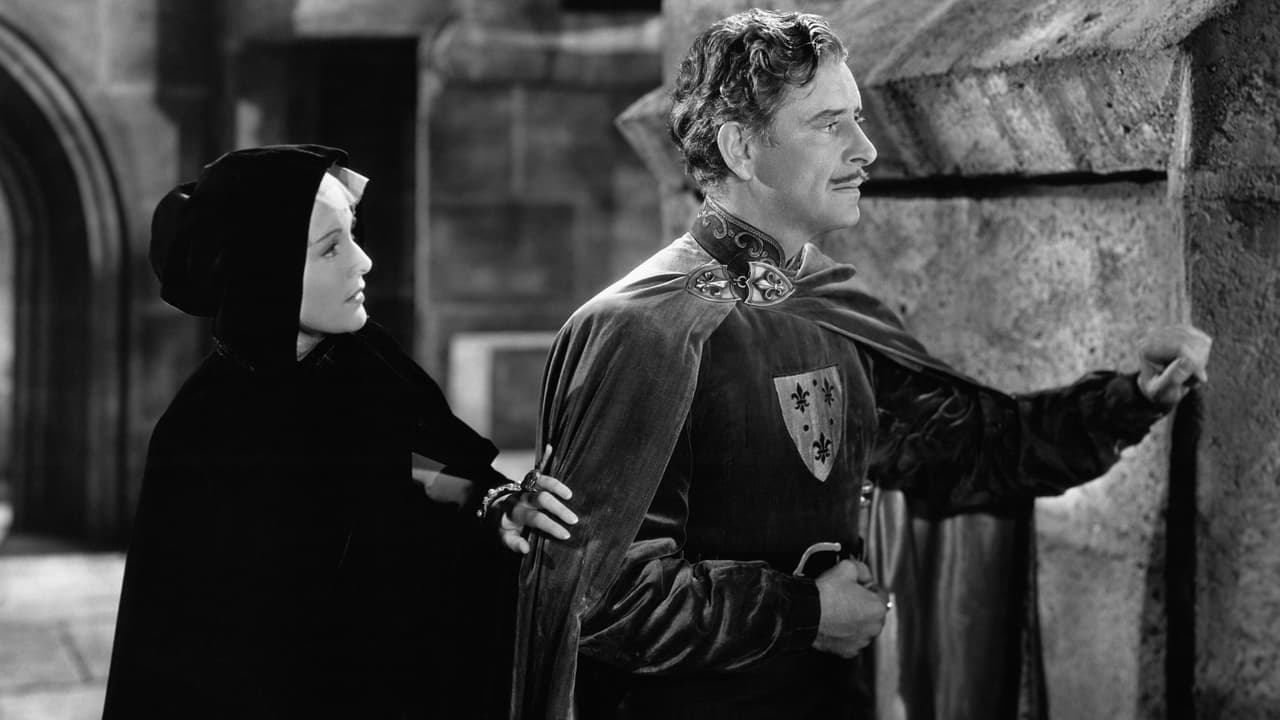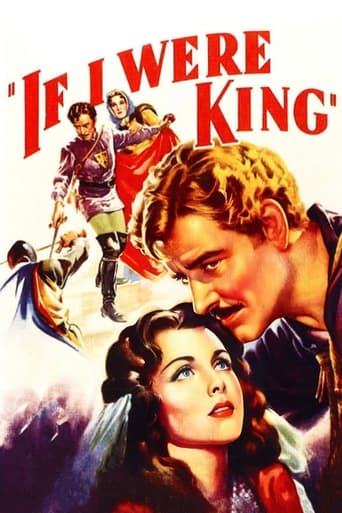



Very disappointed :(
It's fun, it's light, [but] it has a hard time when its tries to get heavy.
View MoreTrue to its essence, the characters remain on the same line and manage to entertain the viewer, each highlighting their own distinctive qualities or touches.
View MoreThe movie is wonderful and true, an act of love in all its contradictions and complexity
View More"If I Were King" has a lot going for it. Based upon a 1901 play by Justin Huntly McCarthy that was subsequently transformed into a successful operetta by Rudolph Friml, the screenplay for this version was written by Preston Sturges. That means it includes a significant amount of Sturges' unique brand of sophisticated and sly wit. This was early in Sturges' career, before he emerged as a successful combination writer and director. Sturges' later films included such classics as "The Great McGinty", "Sullivan's Travels", "The Lady Eve", "The Palm Beach Story", "The Miracle of Morgan's Creek" and "Unfaithfully Yours". "If I Were King" also included superior performances by two great actors at the top of their game. Ronald Coleman was the perfect choice to play the swashbuckling poet-rogue, Francois Villon. For the benefit of those not familiar with French literature, Francois Villon really was a 15th Century French poet, he really did graduate from the Sorbonne and he really was a petty criminal who seems to have been constantly in trouble with the law. Born in Paris in 1431, Villon is described as having "disappeared from view" in 1463. To this day nobody really knows for sure what became of him, although the presumption is that he came to no good end. However, there is absolutely no evidence that he ever did anything even remotely heroic. Ronald Coleman possessed more than enough swashbuckling charm to carry the role, as well as the mellifluous voice to make the poetry work as few other actors, even in his day, could have done. Usually known for playing either villains or Sherlock Holmes, Basil Rathbone, was given a rare opportunity to demonstrate his acting virtuosity by playing an aging King Louis IX; the clever, conniving and cynical French monarch who has become known to history as "Louis the Spider". At one point in the movie Preston Sturges has the King self-deprecatingly remark that, "The people of France already have one 'Saint Louis', another would only confuse them".
View MoreRonald Colman and Basil Rathbone, two wonderful actors having the time of their careers playing wittily written opposites who are also spiritual soulmates -- Francois Villon, the poetic rebel, born into poverty with a noble soul, and Louis XI, King of France, born into privilege but with a rebel's iconoclasm. Add a witty script by that poetic comedic rebel Preston Sturges, who hits all the crowd-pleasing buttons without condescension and no-nonsense direction by Frank Lloyd, and you have a top Hollywood product -- a crowd pleaser with intelligence.Rathbone is a particular delight. Pre-Holmes, he revels in playing an unprepossessing cynic to whom everyone must bow because he happens to be the king. Colman is doing what he does best, playing an intelligent, superior man, without losing the common touch. A delight all the way around.
View MoreHollywood certainly had reason to thank their lucky stars that Ronald Colman's career straddled both silent and sound films, and that he was of an age where he was still believable as a romantic leading man as sound became the industry standard. Silent films had made him a major star; sound revealed that amazing, distinctive voice, oft imitated but never surpassed, that made him legendary.Of his amazing output of classic films in the 1930s, IF I WERE KING is one of the most audience-friendly, and, with THE PRISONER OF ZENDA, stands as two of the best swashbucklers of the decade. With a wryly engaging script by the legendary Preston Sturges (based on the famous operatic play by Justin Huntly McCarthy), and the 'no frills' directorial style of veteran director Frank Lloyd (who specialized in action films), the fanciful adventures of vagabond poet François Villon (Colman) may lack the sweep of the Michael Curtiz/Errol Flynn spectacles at Warner Brothers, but makes up for it with humor, a sense of the absurd, and Colman, himself, who could act rings around the younger Flynn.As fifteenth century Paris is besieged and slowly crushed by Burgundian armies, all that holds the city, and the dream of a united France together, is the iron will of doddering old King Louis XI (brilliantly portrayed by frequent Flynn nemesis Basil Rathbone, who is obviously having a ball in the character role). Meanwhile, the rabble of the city, victims of the corruption of the court, are stirred by the writings of poet/revolutionary Villon, who steals from the rich, dodges authorities nimbly, and is unafraid to speak the truth. While drinking stolen wine with friends at a local inn, he presents such an eloquent case of how he'd change things "If I were King", that Louis, watching in disguise, and well aware of his government's shortcomings, decides to put Villon to the test. Capturing the revelers, he surprises the poet by appointing him Lord High Chancellor for a week, daring him to improve things...and Villon delivers, demanding the Burgundians to surrender(!), opening the food coffers to the starving masses (and forcing the aristocracy out of their well-fed complacency), dispensing justice tempered with mercy, and creating among the lower classes a sense of patriotism and greater purpose towards King and Country. As the King cackles at the turn of events, the military and aristocracy despise Villon (other than beautiful Katherine de Vaucelles, portrayed by Frances Dee, who falls in love with the Lord High Chancellor, while suspecting him to be the penniless poet who once pledged his love as she attended Mass). As the week draws to a close, and plots and machinations against Villon reach an explosive climax, the future of not only Paris but all of France will depend on the poet's quick wit, decisiveness, and ability to rouse the masses. While the history portrayed is fanciful, Ronald Colman is the perfect embodiment of the charismatic Villon, and Rathbone's cranky gruffness offers the ideal compliment to Colman's suave persona.If the film has a fault, it is in the print itself, which is showing signs of deterioration and aging. One hopes that it will be a candidate for restoration, soon.IF I WERE KING should be preserved for future generations to enjoy!
View MoreThis is a legendary story about François Villon, the mediaeval French poet and adventurer probably best known in English for his line, « Mais où sont les neiges d'antan? » / "But where are the snows of yesteryear?" Some may recognize the line from Joseph Heller's Catch-22 take-off, "Where are the Snowdens of yesteryear?"As I first began watching this, my immediate reaction was, "What an obvious attempt to cash in on The Hunchback of Notre Dame!", the film whose look and feel most closely resemble this one. But my chronology was backwards. The Laughton Hunchback is 1939. If you have ever seen the Chaney Hunchback from 1923, you may have been struck by how different many of the characterizations are from the more familiar version, especially that of the King. The 1923 French King is a nasty piece of work, just the sort of thinly disguised Napoleon III that Victor Hugo would conceive of. So where did the doddering but dear-hearted 1939 King played by sweet old Harry Davenport come from then? Well, that's easy. From Basil Rathbone's King in this film. They even look the same!Rathbone, by the way, is completely unrecognizable. If he's played an impish character elsewhere, I've never seen it. He gets most of Preston Sturges's best and most typical lines of dialogue.Sturges is the reason I was watching the film in the first place. Telltale signs are everywhere in the script, but we definitely do not get effervescent dialogue issuing forth from every mouth the way we expect from the later, classic Sturges films.I am not a great fan of Ronald Colman ordinarily but he brings a lot of spirit to his part, even if he doesn't have quite the dash of an Errol Flynn. But he does have a lot to do with this film's overall success.Frances Dee demonstrates once again that she is quite probably the best-looking American actress of the 1930's, although she has all the acting prowess of an Andie MacDowell. (If you insist on talent with your set decoration, then you probably would have preferred to see Paulette Goddard playing the part of the lady-in-waiting who catches Villon's eye.)
View More